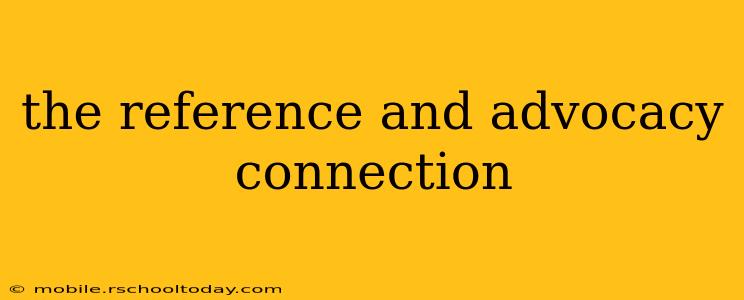In today's competitive job market, a strong professional network is invaluable. While resumes and cover letters highlight skills and experience, references and advocates provide crucial social proof, vouching for your abilities and character. Understanding the subtle yet powerful connection between references and advocacy is key to career advancement. This connection goes beyond simply listing names on a resume; it's about cultivating relationships that translate into genuine support.
What is the difference between a reference and an advocate?
This is a crucial distinction. A reference typically provides factual information about your work history and skills. They confirm your employment dates, responsibilities, and achievements, often responding to standardized questionnaires. An advocate, on the other hand, goes beyond simply verifying information. They actively promote your candidacy, speaking highly of your abilities to potential employers, networking on your behalf, and even offering unsolicited endorsements.
How can I cultivate strong advocacy relationships?
Building a network of advocates requires proactive relationship management and a focus on reciprocity.
- Deliver exceptional work: This forms the foundation of any successful advocacy relationship. Consistently exceeding expectations builds trust and credibility.
- Build genuine relationships: Networking events are helpful, but true advocacy grows from meaningful interactions. Get to know your colleagues and supervisors, demonstrating genuine interest in their work and well-being.
- Seek feedback regularly: Asking for constructive criticism shows you’re committed to improvement. This also opens the door for honest assessments that can be leveraged when you need a reference or advocate.
- Offer support to others: Reciprocity is key. Helping colleagues, mentoring junior staff, and actively supporting others’ endeavors fosters a culture of mutual support.
- Stay in touch: Maintain contact with past supervisors, colleagues, and mentors, even after you've moved on from a role. Regular communication strengthens bonds and keeps you top-of-mind when opportunities arise.
- Inform your network about your career goals: Keeping your contacts updated on your aspirations allows them to be on the lookout for relevant opportunities and better position themselves to advocate for you.
How do I ask someone to be a reference or advocate?
Asking for a reference or, even better, advocacy requires sensitivity and professionalism.
- Provide context: Briefly explain the opportunity and why you're seeking their support. Share your resume or cover letter to provide them with the necessary information.
- Respect their time: Don't just send a generic request. Explain what you need from them specifically. Provide them with ample time to prepare.
- Offer materials: Provide them with a copy of your resume, cover letter, and job description. This will make it easier for them to write a compelling reference or speak on your behalf.
- Express gratitude: Thank them sincerely for their time and willingness to support you. Follow up after the interview or application process to let them know the outcome.
What if someone is hesitant to be a reference or advocate?
Sometimes, individuals may hesitate due to company policies or personal constraints. Respect their decision and don't pressure them. Consider other individuals in your network who may be more comfortable offering support.
Can I list someone as a reference without asking them first?
Absolutely not. Always ask for permission before listing someone as a reference. Failing to do so is unprofessional and could damage your reputation.
How do I choose the right people to be my references and advocates?
Select individuals who know you well, can speak to your skills and accomplishments, and are comfortable speaking positively about you to potential employers. Consider those who have witnessed your work ethic, problem-solving abilities, and leadership skills.
By consciously cultivating these relationships and understanding the nuances between a reference and an advocate, you can significantly enhance your professional prospects and unlock valuable opportunities. Remember, it's a two-way street: strong professional relationships are built on mutual respect, trust, and a commitment to reciprocal support.
